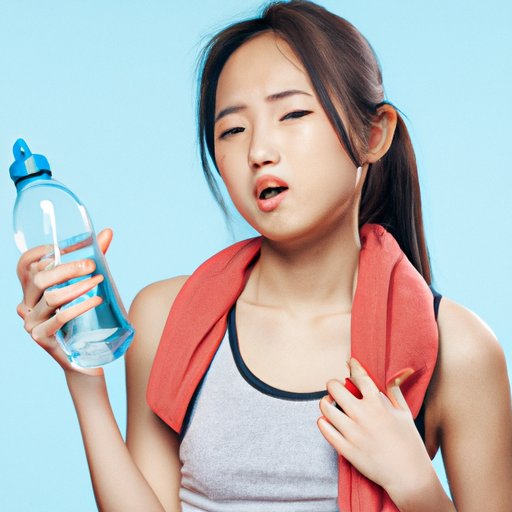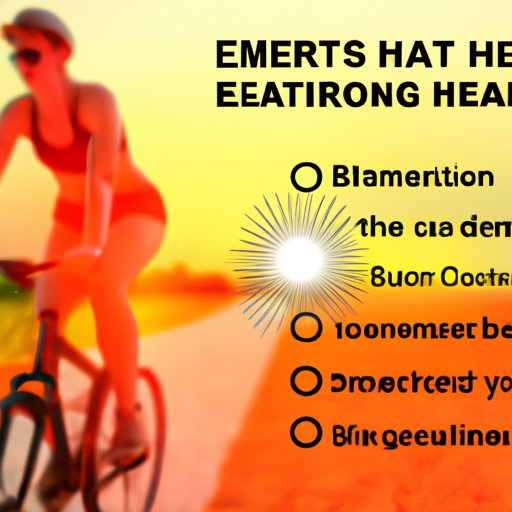
Introduction
Summer is often associated with warmth, sunshine, and relaxation. However, for many people, high temperatures and humidity can also lead to fatigue, exhaustion, and decreased productivity. The human body is designed to regulate its temperature through a complex system of physiological processes, but sometimes hot weather can short circuit that system, leading to a feeling of tiredness. In this article, we will explore the science behind why heat makes you tired. Additionally, we will provide practical tips to stay energized, sleep better, and improve your mood in hot weather.
Heat Exhaustion: Understanding the Science Behind Why You Feel Tired in Summer
When the body is exposed to high temperatures, it engages in various mechanisms to stay cool. Sweating is the most well-known of these mechanisms. As sweat evaporates, it reduces body temperature. When the air is hot and humid, however, sweat does not evaporate as effectively, making it difficult for the body to regulate its temperature. As the body continues to struggle to maintain its desired temperature, it experiences a state of heat exhaustion. This state involves fatigue, weakness, dizziness, headache, and other symptoms that can range from mild to severe. If left untreated, heat exhaustion can progress to heat stroke, which is a medical emergency.
Practical Tips to Beat the Heat and Stay Energized
Fortunately, there are simple ways to boost your energy levels and stay cool in hot weather. One effective way is to wear loose, light-colored clothing that allows air circulation. Additionally, spending time in air-conditioned spaces can help regulate body temperature. If air conditioning is not available, cool showers or wet towels can provide temporary relief. Lastly, it is crucial to avoid direct sunlight during the hottest parts of the day and to avoid strenuous activities that could lead to dehydration and heat exhaustion.
The Impact of Heat on Your Sleep: Why Heat Can Disrupt Your Rest
High temperatures can also have a negative impact on sleep quality. When the body is exposed to uncomfortable heat during sleep, it can lead to restless sleep and early awakenings. Additionally, hot temperatures can cause an increase in heart rate and blood pressure, making it harder for the body to fully relax. To improve sleep quality in hot weather, it is recommended to sleep in a cool, dark, and quiet environment. Using a fan or air conditioner can help lower the room’s temperature and promote better sleep.
Hydration and Energy: The Connection Between Water Intake and Feeling Alert in Hot Climates
Dehydration is one of the most significant factors contributing to tiredness and fatigue in hot weather. When the body loses water through sweating, it can affect energy levels, brain function, and other vital organs. To combat dehydration and fatigue, it is essential to drink enough water throughout the day. Experts recommend drinking at least eight cups of water daily, and even more during hot weather or active periods. Drinking water not only keeps you hydrated but also helps regulate body temperature and promote alertness.
How to Adjust Your Diet to Combat Heat-Induced Tiredness
Another way to combat heat-induced tiredness is through a healthy and balanced diet. During hot weather, it is especially important to eat foods that provide energy and nutrients without adding too much heat to the body. Fruits and vegetables, such as watermelon or cucumber, are excellent choices as they contain high amounts of water and electrolytes. Additionally, avoiding large meals and sticking to smaller, frequent meals can help regulate digestion and body temperature. Lastly, excessive caffeine or alcohol intake should be avoided as they can exacerbate dehydration and heat exhaustion.
The Psychological Impact of Heat: Why Muggy Weather Can Make You Feel Emotionally Drained
Heat-induced fatigue is not purely physical; it can also have an emotional and psychological impact. Mood changes such as irritability, apathy, and lack of motivation are some of the symptoms that people experience during hot weather. The reason for this is that the body works harder in hot weather, leading to mental and emotional exhaustion. To combat heat-induced emotional stress, it is vital to prioritize mental health and self-care, such as meditation, relaxation, and avoiding stressful situations as much as possible.

The Benefits of Exercising in the Heat: How Heat Acclimation Can Improve Your Energy Levels
While it may seem counterintuitive, exercising in hot weather can actually lead to increased energy levels and improved endurance. Regular exercise in hot conditions helps the body acclimate to high temperatures and improve its physiological responses to heat. It can lead to better cardiovascular fitness and overall well-being. However, it is crucial to take precautions when exercising in hot weather, such as wearing appropriate clothing, staying hydrated, and avoiding strenuous activities during the hottest parts of the day.
Conclusion
Hot weather can make you feel exhausted and drained, but it doesn’t need to be that way. By understanding the science behind heat exhaustion and its symptoms, you can take proactive steps to combat heat-induced tiredness. From adjusting your diet and drinking enough water to staying in air-conditioned spaces and getting some exercise, there are many practical tips to stay energized and healthy in summer. Be kind to yourself, prioritize self-care, and enjoy the warmth and beauty of summer while keeping your energy levels high.





